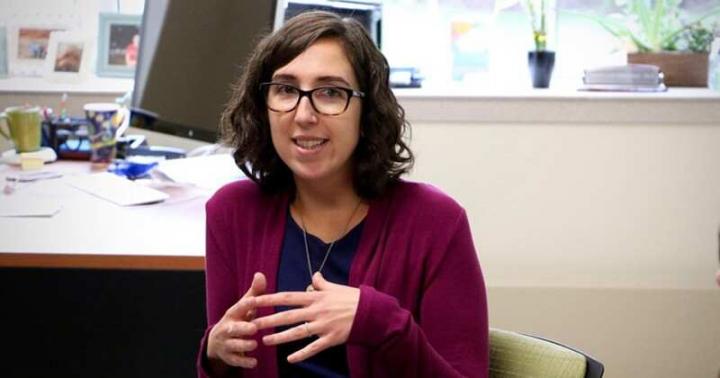Doctors are key in communicating facts to patients

Credit: Photo by Elizabeth Adams
The World Health Organization calls the spread of false information about the coronavirus (COVID-19) an “infodemic,” and the results are broadly visible across society. The refusal of some people to wear a mask or socially distance, or self-quarantine when exposed to the virus, is often motivated by false information or conspiracy theories that are popular on social media.
So what are public health officials to do?
In a pair of newly published studies, University of Delaware researchers shed new light on the stigma, stereotypes and conspiracy theories that have spread alongside the novel coronavirus.
Understanding the impact of misinformation “is important for identifying potential barriers to public health efforts” to combat the virus, said Valerie Earnshaw, associate professor in UD’s Department of Human Development and Family Sciences and lead author on both studies.
“Evidence suggests that people are more likely to believe conspiracy theories when they feel anxious, powerless, and unable to control their outcomes, as well as in times of crisis and when faced with large-scale events with serious consequences,” she said. “Pandemics such as COVID-19 are powerful contexts wherein individuals may turn to conspiracy theories in an attempt to restore feelings of safety and control.”
Ultimately, the more prominent the misinformation, the more difficult it will be for communities to bring the pandemic under control.
The first study, “Anticipated Stigma, Stereotypes, and COVID-19 Testing,” which appeared in the journal Stigma and Health, suggests that stereotypes and anticipated stigma may be barriers to COVID-19 testing efforts. The results, Earnshaw said, are very similar to previous studies about HIV and Ebola stigma.
“We know from studies on mental illness and HIV that stigma will keep people from getting tested,” said Earnshaw. “And stereotypes are one way that people experience stigma. Stereotypes are how stigma gets into our heads and shapes our views. Stereotypes help people feel safe. Stereotypes help people believe that those who get COVID, or HIV, are unlike them or doing the wrong thing. Stereotypes can sometimes give people a false security blanket.”
Participants who anticipated more stigma, and those who endorsed more harmful stereotypes, reported that they would be less likely to get tested for COVID-19. By contrast, participants who demonstrated greater knowledge of COVID-19 reported that they would be more likely to get tested.
The second study, “COVID-19 conspiracy beliefs, health behaviors, and policy support,” which appeared in the journal Translational Behavioral Medicine, found that one-third of participants believed in one or more conspiracies about COVID-19, and the results suggest that belief in conspiracy theories makes a person less likely to support public health policies designed to slow the spread of the virus. Participants who believed in conspiracy theories said that they were less likely to get vaccinated and trusted public health experts less.
The results of both studies were derived from an online survey of 845 U.S. adults that was conducted in April 2020. The survey was posted to Amazon Mechanical Turk, a crowdsourcing marketplace that researchers use to “collect rapid, high-quality data for psychological studies,” said Earnshaw.
Despite the prevalence of misinformation, both studies suggest that people trust their personal doctor, regardless of their conspiracy beliefs. In the first study, most participants agreed that they would get tested if ordered by their doctor. In the second study, over 90% said they trusted information about COVID-19 from their doctor.
“Medical doctors are highly trusted sources of medical information,” said Earnshaw. “Doctors can play a leading role in combating misinformation because even people who believe conspiracy theories still believe information about COVID from their doctors.”
###
Media Contact
Peter Kerwin
[email protected]
Original Source
https:/




